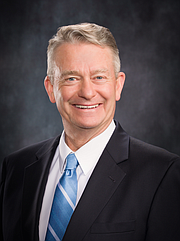STAY HOME!
Folks in the Silver Valley are adjusting to life inside following Gov. Brad Little’s stay-home order on Wednesday afternoon.
Following a sizable uptick in the total number of COVID-19 cases in Idaho, Little gave his proclamation during a mid-day press conference where he said the focus was on protecting Idaho’s most at-risk residents by keeping others at home.
“From the get-go, our focus has been to slow the spread of coronavirus to protect our most vulnerable citizens and preserve capacity in our health care system,” Gov. Little said during the press conference. “And from the beginning, I stated my commitment to making decisions about our response to coronavirus based on science. With confirmed community transmission of coronavirus now occurring in Idaho’s most populated areas, we need to take strong measures to ensure our health care facilities are not overburdened. I am following the guidance of our public health experts and issuing a statewide stay-home order effective immediately.”
Little’s stay-home order also broke people up into two categories — essential and non-essential.
Most locals seemed to know where they would fit, but there were a few surprises, including liquor stores, which fell into the “essential” category.
The stay-home order requires citizens to self-isolate at home if they can, not just if they are sick and excludes places such as grocery stores, medical facilities and convenience stores.
Restaurants were forced to close their dine-in areas, but drive-through, pick up and delivery are still available to be open.
The order also stated that those considered as “non-essential” businesses must close for the time being.
Those non-essential businesses include, but are not limited to: Bars, nightclubs, gyms, recreational facilities, entertainment venues, convention centers, and hair and nail salons, and most non-essential retail.
The reason behind the strict guidelines, according to Little, is surrounding the idea that folks who can stay out of the way do so to ensure that those who are vital to their communities can remain as safe as possible.
“Our health care and public safety workers are putting themselves in harm’s way to respond to the coronavirus emergency, and we owe it to them to do our part by following this statewide stay-home order,” Gov. Little said.
While indoor gatherings are supposed to be limited to those residing within a household, the stay-home order does allow for outdoor recreation like hiking, biking, walking and running just as long as you do your part to maintain the 6-foot social distancing requirement.
This includes city parks, where people can still go to run around and play, but should avoid the playground equipment.
The city of Kellogg actually taped off its playground equipment at both of its parks earlier this week, including the park on Mission and Riverside avenues.
Recent U.S. Centers for Disease Control and Prevention (CDC) studies say the virus that causes COVID-19 can live on a number of hard surfaces for as much as nine days, particularly if the surface is metal, glass or plastic, which are your basic components of a playground.
The statewide stay-home order went into effect immediately on Wednesday and will remain in effect for 21 days (from the date declared).
Little also signed an extreme emergency declaration, which allows the state to more effectively increase health care capacity, take steps to reduce and slow coronavirus spread, and take rapid and decisive steps to improve the condition of Idahoans whose job and incomes are being harmed by the pandemic.
“We will get through this together as long as we all play an active part in fighting the spread of coronavirus. I am proud of Idaho and the way we support and love our neighbors. Let’s keep it up,” Gov. Little said.
Gov. Little and public health officials will continue to evaluate whether to extend the order past 21 days.
The full list of “essential” businesses, as well as other important and valuable information can be found at www.coronavirus.idaho.gov.



